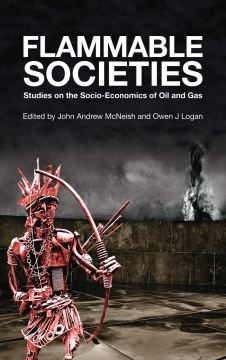
Additional Information
Book Details
Abstract
The impact of the oil and gas industry – paradoxically seen both as a blessing and a curse on socio-economic development – is a question at the heart of the comparative studies in this volume stretching from Northern Europe to the Caucasus, the Gulf of Guinea to Latin America.
Britain’s transformation under Margaret Thatcher into a supposedly post-industrial society orientated towards consumer sovereignty was paid for with revenues from the North Sea oil industry, an industry conveniently out of sight and out of mind for many. Other case studies include resource struggles in Bolivia, oil money in Venezuela and the Azerbaijani oil boom among many others.
Drawing on bottom-up research and theoretical reflection, this book questions the political and scientific basis of current international policy that aims to address the problem of resource management through standard Western models of economic governance, institution building and national sovereignty.
'Offers fresh insights into the social relations of communities in which oil and gas are produced. It challenges lazy, catch-all concepts about oil-producing economies and raises the standard of academic debate'
Simon Pirani, Senior Research Fellow at the Oxford Institute for Energy Studies and author of Change in Putin’s Russia
'A much-needed and compelling intervention. deftly capturing the complexity of hydrocarbon conflicts'
Suzana Sawyer, University of California, Davis, author of "Crude Chronicles" (2004) and co-editor of "The Politics of Resource Extraction" (2012)
'Unsettles the field of oil studies by fusing visual, textual, historical and ethnographic approaches into a powerful whole. A path-breaking book'
Michael Watts, Class of 63 Professor, University of California, Berkeley
Table of Contents
| Section Title | Page | Action | Price |
|---|---|---|---|
| Cover | Cover | ||
| Contents | v | ||
| List of Figures | vii | ||
| Acknowledgements | ix | ||
| Introduction | 1 | ||
| 1. Rethinking Responsibility and Governance in Resource Extraction - Owen Logan and John-Andrew McNeish | 3 | ||
| Part I: Resource Sovereignties | 45 | ||
| 2. On Curses and Devils: Resource Wealth and Sovereigntyin an Autonomous Tarija, Bolivia - John-Andrew McNeish | 47 | ||
| 3. A Contribution to the Critique of Post-Imperial British History: North Sea Oil, Scottish Nationalism and Thatcherite Neoliberalism - Terry Brotherstone | 70 | ||
| 4. Where Pathos Rules: The Resource Curse in Visual Culture - Owen Logan | 98 | ||
| Part II: States of Collective Consumption | 131 | ||
| 5. Development from Below and Oil Money from Above: Popular Organisation in Contemporary Venezuela - Iselin Åsedotter Strønen | 133 | ||
| 6. Living under the Bullet: Internal Displacement in the Azerbaijani Oil Boom - Heidi Kjærnet | 156 | ||
| 7. The Socio-economic Dynamics of Gas in Bolivia - Fernanda Wanderley, Leila Mokrani and Alice Guimarães | 176 | ||
| 8. Subsidised Energy and Hesitant Elites in Russia - Indra Øverland and Hilde Kutschera | 201 | ||
| Part III: Supply-side Governmentality | 219 | ||
| 9. North Sea Oil, the State and Divergent Development in the United Kingdom and Norway - Andrew Cumbers | 221 | ||
| 10. A Country Without a State? Governmentality, Knowledge and Labour in Nigeria - Femi Folorunso, Philippa Hall and Owen Logan | 243 | ||
| 11. The Race to the Bottom and the Demise of the Landlord: The Struggle over Petroleum Revenues Historically and Comparatively - Anna Zalik | 267 | ||
| 12. Law’s Role in the Tension Between Security and Sovereignty in the Field of Energy Resources - John Paterson | 287 | ||
| 13. Fossil Knowledge Networks: Industry Strategy, Public Culture and the Challenge for Critical Research - Bret Gustafson | 311 | ||
| 14. Conclusion: All Other Things Do Not Remain Equal - John-Andrew McNeish and Owen Logan | 335 | ||
| Contributors | 353 | ||
| Index | 358 |
